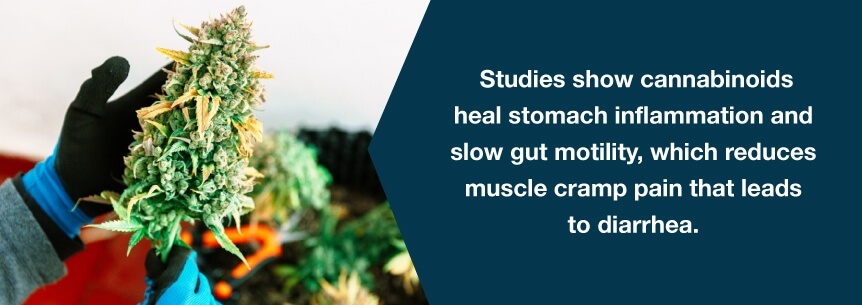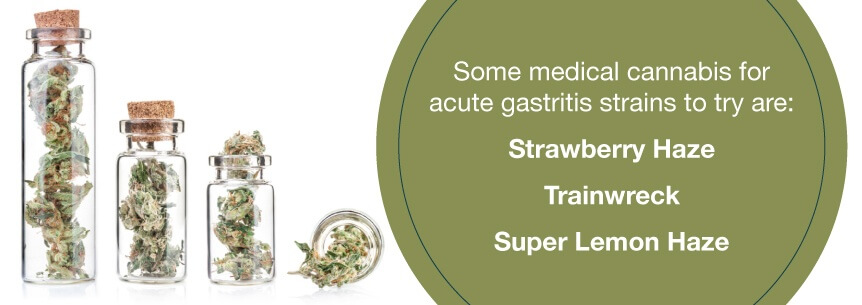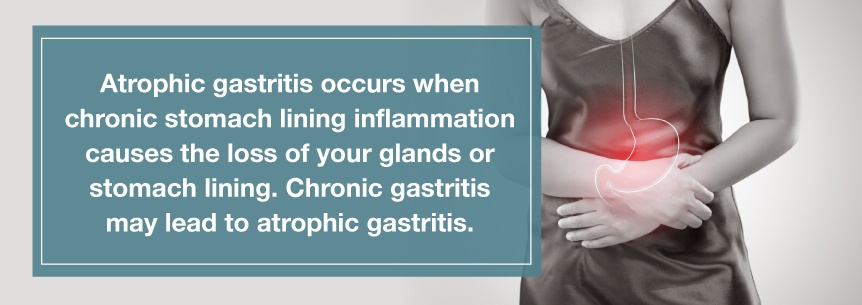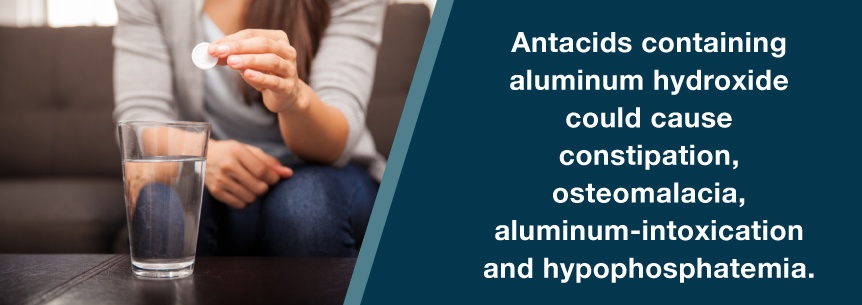For many years, healthcare specialists have been treating gastritis with medicines, such as protein pump inhibitors and H2 antagonists, to reduce the amount of the acid the stomach produces. However, some people experience side effects from these medicines.
Fortunately, cannabis has been used to help treat medication side effects as well as treat gastritis symptoms. Researchers are studying how well medical marijuana treatment for acute gastritis works for easing pain, inflammation and other symptoms of the condition.
People have cannabinoid receptors both in their gut and brain. It’s thought they’re an essential part of the healing process of a gut that’s damaged. Studies show cannabinoids heal stomach inflammation and slow gut motility, which reduces muscle cramp pain that leads to diarrhea.

Medical marijuana for acute gastritis has been shown to relieve acute gastritis-related pain in patients. Medical weed improves the appetite in patients and eases their pains, aches and stress associated with their condition.
Cannabis also doesn’t pose a risk of addiction like other conventional medications. However, depending on dosage and strain, some patients experience slowed reaction times, paranoia, dry mouth, red eyes, increased heart rate and drowsiness as some of the side effects of marijuana.
Find A Doctor Find A Dispensary
Common acute gastritis symptoms that cannabis for acute gastritis treatment helps with include:
Some ways it helps these and other symptoms include:
Using small doses of medical cannabis regularly can help eliminate acute gastritis. However, you need to choose the right strains to relieve your symptoms optimally and keep in mind that medical marijuana is not without side effects if it’s misused. If you dose incorrectly, you could develop certain side effects, as described above.
Some medical cannabis for acute gastritis strains to try are:

You may also try other strains for more specific symptoms like inflammation, nausea, appetite, pain or anxiety and depression, such as these options:
There’s a best delivery method for using marijuana and acute gastritis treatment for each person, including those who are looking for a bit of discretion. Cannabis ingestion methods generally fall under a few broader categories: oral methods, inhalation and topical.
Methods of use may include:
Smoking may not be the best method for you if you have respiratory conditions, like asthma or COPD.
If you’re searching for more information on medical cannabis or are looking for a cannabis clinic, MarijuanaDoctors.com can help. We understand that the regulation of medical marijuana is new and confusing, so we offer you a comprehensive website with a plethora of resources to help educate you on all things cannabis.
We also offer an expansive list of qualified cannabis doctors and a directory of marijuana dispensaries you can connect with. The process of starting your marijuana treatment is simple with MarijuanaDoctors.com. Just book your appointment online, and we’ll help you with the rest.
Find A Doctor Find A Dispensary
Acute gastritis is where you experience sudden swelling or inflammation in your stomach lining. It can cause nagging, severe pain. This pain, however, is temporary and typically only lasts for brief periods of time. Gastritis is acute when it’s short-lived, but it can become chronic.
Gastritis is not the same as gastroenteritis. Gastroenteritis affects both your intestines and stomach, causing symptoms like nausea, vomiting or diarrhea. Gastritis affects your stomach only and could cause symptoms of nausea and vomiting.
Acute gastritis can occur when your stomach lining is weak or damaged. When you have a weak or damaged stomach lining, it allows your digestive acids to aggravate your stomach.
Acute gastritis appears suddenly and has several causes, including:
H. pylori bacteria may infect your stomach and lead to peptic ulcers. While it’s not known how H. pylori spreads, it may lead to loss of appetite, stomach inflammation, abdominal pain, nausea and more.
Or, gastritis can occur by ingesting irritants like:
Other less common causes of acute gastritis include:
Individuals may experience symptoms with gastritis uniquely. Some may have no symptoms at all. The most common acute gastritis symptoms are:
Some physical effects of acute gastritis often include:
In many instances, acute gastritis doesn’t lead to many complications. However, it can, in rare cases, cause life-threatening, severe bleeding.

Gastritis patients have a higher risk for anxiety and mood disorders, according to the results of a study published in the Journal of Psychiatric Research. After accounting for gender, age and socioeconomic status in the study, the researchers found that those with gastritis had a higher risk than the general population in the previous 12 months, to have had any:
There was a stronger link between anxiety and mood disorder and gastritis in men than in women, even though it wasn’t a significant difference.
Past statistics show the gastritis prevalence rate of gastritis was around 2.7 million individuals or one in 100 (0.99%) in the U.S.
Georg Ernst Stahl, a German physician, first used the term “gastritis” in 1728. Giovanni Battista Morgagni, an Italian anatomical pathologist, further described the gastric inflammation characteristics. He described the characteristics of ulcerative or erosive gastritis.
Between the years 1808 and 1831, François-Joseph-Victor Broussais, a French physician, collected data from an autopsy of deceased French soldiers. He noted chronic gastritis to be “Gastritide” and mistakenly believed gastritis was the cause of typhoid fever, ascites, and meningitis.
Wilson Fox and Charles Handfield described microscopic changes to the stomach’s inner lining with gastritis in 1854, which existed in segmental and diffuse forms. In 1859, William Brinton, a British physician, first described chronic, acute and subacute gastritis.
Some acute gastritis cases disappear without requiring treatment, and consuming a bland diet can help with a speedier recovery. Acute gastritis patients tend to tolerate foods best that are:
Also, if you can tolerate it, physicians suggest adding lean meats like turkey or chicken breast to your diet.
Many individuals require treatment for acute gastritis, though. Both treatment and recovery times vary depending on what’s causing gastritis and its severity. For instance, H. pylori infections might require a couple of rounds of antibiotics. Other treatments may involve medications for reducing symptoms, like those that treat viruses.
Treatment options may include the following:
Making some lifestyle changes could help reduce your symptoms of acute gastritis. Some lifestyle changes that could help are:
There are both over-the-counter and prescription medicines for gastritis. Often, your doctor will recommend a combination of drugs, including the following:
Antacids
These include TUMS®, Pepto-Bismol or milk of magnesia. They work by neutralizing your stomach acid. Those with gastritis often try these to find relief. Some brands even use a combination of three basic salts: aluminum, calcium, and magnesium, along with bicarbonate ions or hydroxide to neutralize stomach acid.
There are various side effects that are possible when taking antacids, however, including the following:

H2 Antagonists
H2 antagonists like cimetidine (Tagamet) and famotidine (Pepcid) reduce stomach acid production.
Side effects of H2 antagonists include:
Proton Pump Inhibitors
These include esomeprazole (Nexium) and omeprazole (Prilosec), and they inhibit stomach acid production.
Side effects of proton pump inhibitors include:
Nonsteroidal Anti-Inflammatory Drugs (NSAIDs)
Some physicians may suggest NSAIDs for the treatment of acute gastritis in some patients.
Side effects of NSAIDs may include:
Current prescribed inflammatory medications for treating acute gastritis can pose long-term use problems.
Antibiotics
Your doctor may prescribe you antibiotics if you have a bacterial infection, such as from H. pylori. Some antibiotics commonly used for treating H. pylori are tetracycline, amoxicillin, and clarithromycin. Your doctor may prescribe antibiotics in combination with an antacid, proton pump inhibitor or H2 antagonist.
Side effects of antibiotics include:
Your doctor might suggest you stop taking any corticosteroids or NSAIDS to see if your symptoms get better. Don’t stop taking any prescription drugs without consulting with your doctor first, though.
Some recent acute gastritis developments include new clinical trials and studies such as:
There have also been other trials and studies to show the safety and efficacy of certain medications and treatments for acute gastritis.